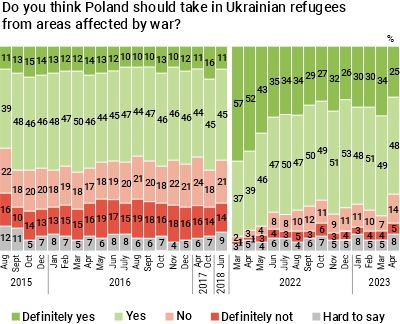14/2023
2023-05-22
Drop in Support for Taking in Refugees from Ukraine
April saw a clear, 10-point, drop in the percentage of Polish people who support taking in refugees from Ukraine (73%, compared to 83% in March). Although a decided majority of those surveyed are still in favour, this is the lowest result since the outbreak of the war. Virtually every fifth Pole (19%, a rise of 8 points on March) is now against taking in Ukrainian refugees, which is the highest result since the outbreak of the war. These changes can probably be linked to the uncertain economic situation, and in particular to the uncontrolled influx of cheap Ukrainian grain, which has recently led to a wave of protests.

|
Support for taking in Ukrainian refugees is less frequently expressed by younger respondents, people living in smaller places, those who are less educated or consider themselves less well-off, and by those without decided political views. When it comes to occupational groups, homemakers are notable for their particularly low support in the matter of taking in Ukrainian refugees. Interestingly, further analysis of the data shows that among the youngest group surveyed (a group regularly under CBOS observation), it is young women who are chiefly responsible for this drop in support.
More on this subject in the CBOS report.
This ‘Current Events and Problems’ survey (396) was conducted using a mixed-mode procedure on a representative sample of named adult residents of Poland, randomly selected from the National Identity Number (PESEL) register. Respondents independently selected one of the following methods: Computer Assisted Personal Interview (CAPI); Computer Assisted Telephone Interview (CATI), respondents receiving researchers’ telephone numbers in an introductory letter from CBOS; Computer Assisted Web Interview (CAWI), where respondents filled in the online questionnaire independently, gaining access by means of a login and password provided in an introductory letter from CBOS. The survey was carried out between 11 – 20 March 2023 inclusive on a sample of 1081 people (56.9% using the CAPI method, 24% CATI and 19.1% CAWI). CBOS has been conducting statutory research using the above procedure since May 2020, stating in each case the percentage of personal, telephone and internet interviews.





